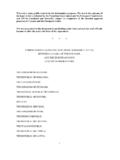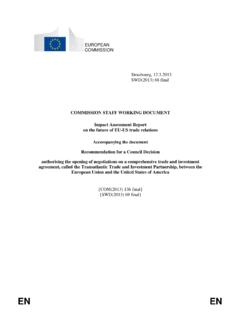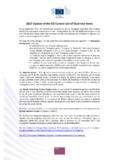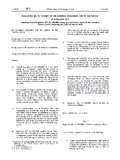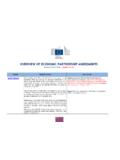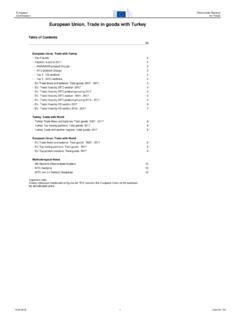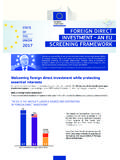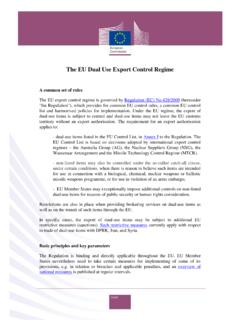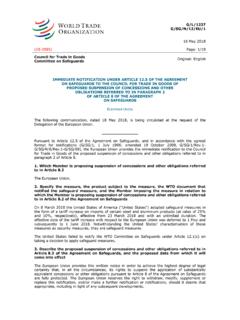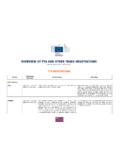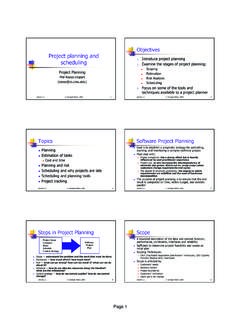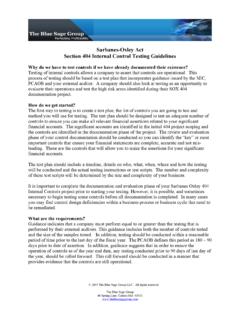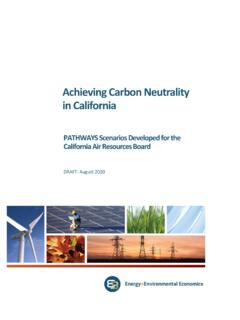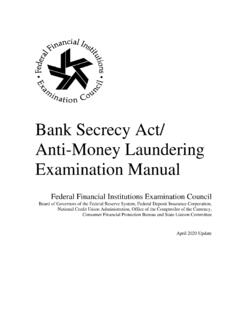Transcription of Guidance on due diligence for EU businesses to address the ...
1 1 Guidance ON DUE diligence FOR EU businesses TO address THE RISK OF FORCED LABOUR IN THEIR OPERATIONS AND SUPPLY CHAINS1 INTRODUCTION An estimated 25 million people are in forced labour Out of this number, 16 million are exploited in the private sector, million are in forced sexual exploitation and 4 million in forced labour imposed by state authorities. Women and girls are disproportionately affected by forced labour. Combatting forced labour is a priority for the In line with the EU Charter of Fundamental Rights, the EU is committed to eliminating all violations of fundamental principles and rights at work, including forced labour, promoting the protection of victims of business-related abuses, as well as ratification and effective implementation of ILO fundamental conventions.
2 In accordance with the EU Treaties, the EU promotes respect for human rights, including labour rights, in the world. This includes also a long standing commitment of the EU to decent work 4. Responsible business conduct by European companies plays a crucial role in ensuring that EU policies on human rights are effectively implemented, including with regard to labour. The EU is committed to promoting the implementation of responsible business conduct5 across all sectors of production and all levels of the supply chain and the protection of victims of business-related human rights violations and abuses, and calls on EU companies to respect human rights, including labour rights, regardless of their location, size, sector, operational context, ownership and structure.
3 1 The information set out in this document does not necessarily reflect the official position of the European Commission or the European External Action Service, which under no circumstances can be held liable or responsible for the use that may be made thereof. 2 Global Estimates of Modern Slavery (2017); @ 3 See for instance EU Action Plan on Human Rights and Democracy 2020-2024 4 European Commission Communication, Promoting decent work for all - The EU contribution to the implementation of the decent work agenda in the world, COM/2006/0249 final; Council Conclusions on Human Rights and Decent Work in Global Supply Chains, December 2020; 5 See European Commission, Staff Working Document, Corporate Social Responsibility, Responsible Business Conduct, and Business & Human Rights: Overview of Progress, March 2019.
4 (2019)143&lang=en 2 PURPOSE In the Communication Trade Policy Review on 18 February 20216 the European Commission committed to provide Guidance to assist EU businesses on taking appropriate measures to address the risk of forced labour in their operations and supply chains, in line with international due diligence guidelines and principles. This document replies to this commitment. This document is intended to provide European companies with practical Guidance to implement effective human rights due diligence practices to address the risk of forced labour in their supply In particular, the Guidance explains the practical aspects of due diligence and provides an overview of international standards on responsible business conduct and due diligence that are relevant for combatting forced labour.
5 6 European Commission Communication, Trade Policy Review -An Open, Sustainable and Assertive Trade Policy, COM(2021) 66 final; 7 This document provides practical Guidance on the effective use of existing international, voluntary, due diligence guidelines and principles. It does not create any legal obligations for companies. It has, therefore, a non-legally binding character. Recognising forced labour Forced labour - The internationally recognised definition of forced labour is to be found in ILO Convention No. 29 on Forced Labour as all work or service which is exacted from any person under the menace of any penalty and for which the said person has not offered himself voluntarily.
6 Examples of forced labour (on their own or in combination with others): State-orchestrated programmes imposing forced labour of administratively detained persons, prisoners in pre-trial detention, political prisoners, persons detained for trade union activity or peaceful assembly; Debt bondage linked to recruitment fees and/or in the context of trafficking in human beings Forced cropping , compulsory cultivation that ties farmers to their land and forces them to sell their produce to a mandatory concession holder; Reliance on labour discipline for production, an obligation to work as a sanction for violating company rules or failing to complete production quota; Recruitment of children into the armed forces or paramilitary organizations; Restrictions of the ability of workers to change employers or allowed to leave host country without the permission of employer; Restrictions of the movement of workers coupled with other coercive measures ( threat or use of force); Use of irregular, delayed, deferred or non-payment of wages as a means to bind employees to employment; Forcing workers to work more overtime hours than allowed by national law or (when relevant) collective agreements under the menace of penalty.
7 3 The Guidance only addresses the risk of forced labour and does not cover due diligence for other supply chain risks. The EU has already put in place mandatory standards in some sectors and actively promotes the effective implementation of international standards on responsible business conduct. Relevant international instruments include: United Nations Guiding Principles on Business and Human Rights (link) Organisation for Economic Co-operation and Development (OECD) Guidelines for Multinational Enterprises (MNE) (link) OECD Due diligence Guidance for Responsible Business Conduct (link) International Labour Organisation (ILO) Tripartite Declaration of Principles concerning Multinational Enterprises and Social Policy (link) Fundamental ILO conventions (link) As announced in the European Commission 2021 Work Programme, the Commission is currently preparing a legislative proposal on Sustainable Corporate Governance8 to foster long-term sustainable and responsible corporate behaviour.
8 The future proposal will introduce mandatory human rights and environmental due diligence , including on risks linked to forced labour. For the purpose of this Guidance , in line with the language used in the UN Guiding Principles on Business and Human Rights and the OECD Guidelines for Multinational Enterprises, due diligence is the process that businesses should carry out to identify, prevent, mitigate and account for how they address actual and potential forced labour risks in their own operations, supply chains and business relationships. Effective due diligence should be supported by efforts to embed responsible business conduct into policies and management systems and aims at enabling enterprises to prevent and mitigate adverse impacts that they cause or to which they contribute.
9 businesses are encouraged to assess the potential exposure of their supply chain to activities causing or contributing to human rights abuses or violations and to implement appropriate due diligence policies to ensure compliance with international due diligence and labour standards on forced labour. Additional information and support on how to address forced labour can be provided by: ILO Helpdesk for Business and International Labour Standards (link) ILO Handbook for Employers & Business on Combating Forced Labour (link) OECD National Contact Points for Responsible business conduct (link) DUE diligence PRACTICAL ASPECTS Effective due diligence allows companies to identify and address the potential and actual adverse human rights and environmental impacts linked to their operations, products or 8 4 services, including in their supply chains and business relationships.
10 It is an on-going, proactive and reactive process aimed at achieving continuous improvements. Managing labour and human rights risks may be required by government legislation, by investors or business partners. In addition, due diligence may help protect a company s commercial reputation and reduce litigation costs. Due diligence should be commensurate with risks and appropriate to the individual company s circumstances and context, including the specificities of the upstream tiers of the supply chain and the company s size. In addition, due diligence should apply not only to the possible negative impacts that the company may cause or to which it could contribute as a result of its own activities, products or services, but also to the impacts linked to its business relationships, including its subsidiaries, suppliers and contractors.
